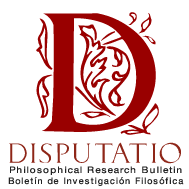Bernhard Weiss
University of Cape Town, South Africa | bernhard.weiss@uct.ac.za
Received: 22-January-2018 | Accepted: 15-April-2018 | Published: 30-June-2019
Disputatio [Jun. 2019], Vol. 8, No. 9, pp. 00-00 | DOI: 10.5281/zenodo.2644656
Article | [EN] | Full Text | Statistics | Copyright Notice [es] | Vol. 8 No. 9
How to cite this article:
Weiss, Bernhard (2019). «Normativity: A Matter of Keeping Score or of Policing?». Disputatio. Philosophical Research Bulletin 8, no. 9: pp. 00-00.
Abstract | Both Brandom and Wittgenstein see meaning and content as emerging from normative social practices. Wittgenstein says little about the constitution of such norms, other than that they are exhibited in practitioners’ judgements of correctness. In addition, they appear already to be content involving, since the moves whose correctness is in question are moves such as asserting that such and such. In contrast, Brandom says a good deal about the constitution of the norms and promises a reductive programme. The norms are essentially inferential and are instituted in the social practice of attributing commitments and entitlements. In particular, we are urged to see the norm-bound move of assertion as capable of being understood in terms of the normative statuses of commitments and entitlements. Jeremy Wanderer calls this Brandom’s bold conjecture. In this paper I use Wittgenstein’s thinking about normativity to reflect on the defensibility of Brandom’s bold conjecture.
Keywords | Normativity · Discursive · Assertion · Content.
![]()
Normatividad: ¿una cuestión de puntaje o de monitoreo?
Resumen | Tanto Brandom como Wittgenstein consideran que significado y contenido emergen de las prácticas normativas sociales. Wittgenstein dice poco sobre la constitución de tales normas apare de que se muestran en los juicios de corrección de los practicantes. Parece además que las mismas ya involucran un contenido, puesto que los movimientos cuya corrección está en cuestión son movimientos como afirmar que tal y tal. Brandom, en cambio, nos dice un buen número de cosas sobre la constitución de las normas y promete un programa reductivo. Las normas son esencialmente inferenciales y se establecen en la práctica social de atribuir compromisos y derechos. Se nos insta en particular a ver el movimiento de afirmar regido por normas como capaz de ser entendido en términos de estatus de compromisos y derechos. Jeremy Wanderer llama esto la audaz conjetura de Brandom. Yo uso en el presente trabajo el pensamiento de Wittgenstein acerca de la normatividad para reflexionar sobre la defendibilidad de la conjetura audaz de Brandom.
Palabras Clave | Normatividad · Discursivo · Afirmación · Contenido.
References
Beran, Ondřej, Vojtěch Kolman, Ladislav Koreň (eds.) (2018). From Rules to Meanings: New Essays on Inferentialism. Abingdon: Routledge.
Brandom, Robert B. (1994). Making It Explicit [MiE]. Cambridge, MA: Harvard University Press.
Loeffler, Ronald (2018). Brandom. Cambridge: Polity.
McDowell, John (1987). “In Defence of Modesty”, pp. 59–80. In Michael Dummett: Contributions to Philosophy, edited by Barry Taylor. Dordrecht: Matinus Nijhoff.
McDowell, John (2005). “Motivating Inferentialism: Comments on Making it Explicit (Ch.2).” Pragmatics and Cognition 13, no. 1: pp. 121–140. DOI: https://doi.org/10.1075/pc.13.1.10mcd
MacFarlane, John (2010). “Pragmatism and Inferentialism” pp. 81-95. In Reading Brandom: On Making it Explicit, edited by Jeremy Wanderer and Bernhard Weiss. Abingdon: Routledge.
Wanderer, Jeremy (2008). Robert Brandom. Stocksfield: Acumen.
Weiss, Bernhard (2010). “Rules and Talking about Rules.” International Journal of Philosophical Studies 18, no. 2: pp. 229–241. https://doi.org/10.1080/09672551003677861
Weiss, Bernhard (2018). “Let’s Admit Defeat: Assertion, Denial, and Retraction” pp. 97–112. In From Rules to Meanings: New Essays on Inferentialism, edited by Ondřej Beran, Vojtěch Kolman, Ladislav Koreň. Abingdon: Routledge.
Wittgenstein, Ludwig (1958). Philosophical Investigations, Oxford: Blackwell.
Wittgenstein, Ludwig (1978). Remarks on the Foundations of Mathematics. 3rd edition. Oxford: Blackwell.
© The author(s) 2019. This work, published by Disputatio [www.disputatio.eu], is an Open Access article distributed under the terms of the Creative Commons License [BY–NC–ND]. The copy, distribution and public communication of this work will be according to the copyright notice. For inquiries and permissions, please email: boletin@disputatio.eu.
